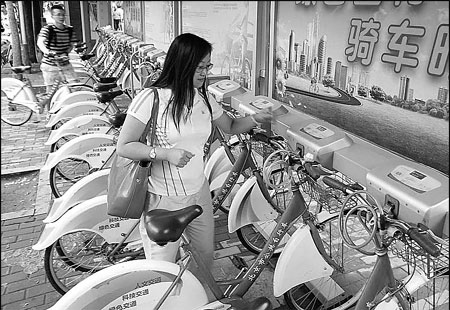Beijing to double bicycles for rent, with more to come
Updated: 2013-07-18 08:13
By Zheng Xin (China Daily)
|
||||||||
|
With Beijing's transport authority denying it has plans to raise fares, experts are suggesting a solution based around flexible ticket prices on buses and subways. |
Beijing will nearly double its number of bicycles for rent, to 25,000 this year, with plans to add more, in an attempt to cut air pollution and traffic congestion in the city.
With private automobile ownership estimated to exceed 6 million by the end of 2016, Beijing is encouraging a higher use of two-wheeled transport to weaken, if not reverse, the dominance of automobiles in the capital, one cause of severe air pollution in many first-tier cities.
The public rental bicycle project that started in 2011 in Beijing has proved popular, with initial success seeing many of the public taking to bicycles during its two-year trial period.
"The rental service as a public welfare project has to some extent encouraged the use of public transportation in the city so far," said Zhu Haiyan, an employee of the Beijing Commission of Transport.
Like many other city dwellers, Lu Xingchi used to spend two hours daily commuting between his home and office.
What troubled him most was not the crowds and congestion he encountered each day on the subway, but the extra 2 kilometers between his home and the nearest subway station.
"It takes as much time to walk the 2 km as the 13 km riding the underground," said the 27-year-old software engineer.
The time Lu spends commuting has been cut by almost by a third with the greater allocation of public bicycles throughout the city, with one bicycle rental station in the community where Lu lives, in Chaoyang district. "Now I ride a rental bike from my community to Liangmaqiao subway station, where I return the bike and take the subway," Lu said. "You can return the bike right away and don't need to worry it will be stolen."
As more public rental bicycle stations are set up throughout the city, Lu said his family sometimes rents a bicycle for grocery shopping as well. As long as he returns the bike within an hour, the use is free of charge.
The commission said the bikes are free to rent for the first hour, then are charged at 1 yuan (16 cents) for each additional hour. The maximum expense for a full day is no more than 10 yuan but people can only rent a bike for a maximum of three days each time.
People with an ID card or passport can register at designated places and deposit 200 yuan to allow them to use their regular transport card to access the service.
More than 20,000 residents of the capital have subscribed to the service, amounting to more than 36,000 individual rides each week, a weekly increase of 7 percent.
In Chaoyang district, the rental service has been well received, said Mu Liang, manager of GlobalNet Communication Technology Beijing, the operator of the service in the district.
Nearly 12,000 local residents subscribe to the rental service and the district recorded more than 920,000 individual bike rentals since last June, Mu said.
The commission will double the more than 14,000 public bicycles currently dotted around the city by the end of this year and vows to supply riders with a total of 50,000 bicycles and 1,000 service stations covering major urban centers, transportation hubs and commercial areas by the end of 2015.
Making the service pay
The program is operated by businesses but funded by the government with policy support.
The service was first initiated by private businesses, which failed to cover their costs due to meager profits and heavy expenses. Lacking policy support, the private businesses soon either abandoned the service or declared bankruptcy.
"The embarrassment was mainly due to a lack of support from the government for the bike renting system, as the rent alone hardly supports the operation," said an official from the commission on condition of anonymity.
"The government investment is the major reason the bikes are here for rent today," he said.
The commission told China Daily the government will continue investing in the service, which is labeled a public benefit project, and is not considering introducing a business model for the program at present.
Still, experts warn the project has obstacles to tackle, such as improving management and layout planning.
Jiang Zhongguang, a professor of urban planning at the Beijing University of Civil Engineering and Architecture, said as the service grows in size, scientific operation and management is key to benefit the public.
"To make full use of the government funds and allocate the investment where it's most needed, the government should consider adopting a business model, including introducing advertising on the bikes and parking lots," he said.
Hangzhou and Wuhan have introduced advertising to their bike rental service, which has greatly reduced government input.
According to Friends of Nature, an environmental protection NGO based in Beijing, advertising could cover half of the operating cost of the public bicycle renting system in Hangzhou.
"Only with delicate management and scientific policies would the idea get boosted in the long term," Jiang said.
Eventually, the government should retreat from the service when it's running a healthy business model on its own, he said.
To make the program sustainable, Jiang said the city should also clear lanes for bike riders and do more research before choosing where to set up stations.
(China Daily USA 07/18/2013 page5)
Most Viewed
Editor's Picks

|

|

|

|

|

|
Today's Top News
GSK finance head not allowed to leave
Putin puts US ties above Snowden
DPRK demands Panama free seized ship
7.75% growth possible for 2013: IMF
Bomber as rock star?
More use smartphones to access the Internet
Mandela making dramatic progress: daughter
Manila playing for 'sympathy'
US Weekly

|

|














